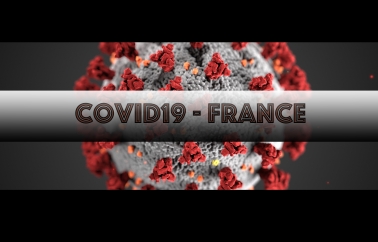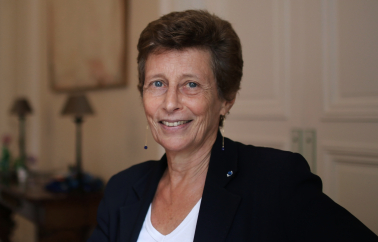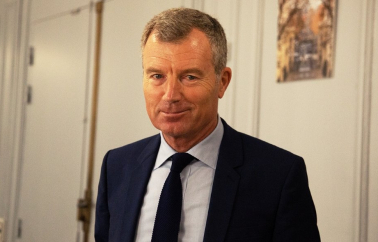
Feedback from Mr. FREYSSELINARD, Prefect of Meurthe-et-Moselle, regarding the COVID19 crisis management
Eric Freysselinard, Prefect of Meurthe-et-Moselle: "We will experience a significant peak of sick people in hospital at the end of the week, but lockdown will prevent us from experiencing a second peak in two weeks."
27 March 2020
In times of health crisis, the prefect is everywhere. He coordinates the arrangements, takes all the measures necessary to protect population and to enforce the rules of daily life during the Covid-19 epidemic.
Eric Freysselinard, prefect of Meurthe-et-Moselle, has one characteristic: he is calm, very calm. He is also smiling, affable, courteous and at the same time very serious in the exercise of his functions. He could have been a psychologist, moreover he is, teacher - he is patient and pedagogue, or specialist in other areas where his curiosity, his interest towards others, his way to easily understand a personality and his quick wit would have done miracles.
He gave up other life possibilities and devoted himself to serve the State. As a result, he prospers in his functions without being only a stiff character, with a starched look in his official uniform.
In times of crisis, he is a reassuring person showing the most solid foundations of his personality. It is the control tower where the obsession with efficiency, the general interest and the sense of humanity take precedence over everything else.
The period we are going through shows your central role in defining and coordinating the arrangements for managing the health crisis. What are these responsibilities?
“The prefecture is at the center of operations in any crisis; it is its nobility and its requirement since all year round, 24 hours a day, Monday to Sunday, it can increase in power after the slightest alert. During this health crisis, it is the Regional Health Agency (RHA), a State institution, which rose on the front line at first.
However, since February 4, I had brought together all the political, institutional and health actors of the crisis, because it is important to always anticipate; I had also received, on March 5, all the union organizations of the state services, including the police unions, and on March 6, the elected officials. Then, very quickly, multiple interministerial themes appeared: help the RHA to get masks from existing stocks of state services, public establishments, local communities and businesses (we have thus distributed 140,000 of them with the help of the prefecture's drivers following the RHA indications. I especially thank Saint-Gobain, Vicat, Novacarb, Storengy, Carsat and all the donors who also bring gowns aprons. The Chinese community of Nancy also donated 30,000 masks to the CHU (Teaching hospital).
We had to implement, after the closure of the schools organized by the rector, a childcare by the nurseries of the departmental council and cities and by State schools for the children of caregivers. To procure hotels and taxis for nursing staff if necessary. To support hospitals, with the prefecture’s interministerial defense and civil protection service, using the resources of approved civil security associations (setting up sorting tents in front of hospital emergency services). To take legal measures and to enforce lockdown with the police and the gendarmerie. To keep in touch with elected officials and socio-economic circles. To monitor border issues, to watch over homeless people and travelers, some of whom have been infected, migrants, detainees who have started to move, to work with funeral operators. Also, to support and to reassure the economic circles which are going through a storm of an exceptional gravity. Respond to questions from our fellow citizens, 7 days a week, by phone and by email with the creation of a dedicated mailbox (pref-covid19@meurthe-et-moselle.gouv.fr). In one week, this box received more than 600 emails and the prefecture more than 1,000 calls. Other subjects, much more important, have been treated by the RHA and the CHU, such as the increasing of resuscitation beds, and we have only provided occasional aid.
The prefect is a kind of conductor who ensures that coordination is optimal, who acts as a firefighter to resolve incidents and takes care of orphan files, numerous in any major crisis. My role is also to listen to and to communicate the difficulties to the regional and zone prefect, Josiane Chevalier, and to the government, which made it possible to move forward on several issues. Every day, at 6.30 p.m., the regional prefect gathers the regional prefects by videoconference and collectively we move forward. Then, every evening, she has a videoconference with Paris. In Nancy, we are also very fortunate to have on the spot the general director of the RHA Christophe Lannelongue. The presence also of the academic rector, Jean-Marc Huart, who had to manage the completely unprecedented closure of all schools and universities, was precious. The relationship between the three of us is excellent."
You manage operations with the director of the Regional Health Agency, the mayors, the heads of health establishments: is it easy to harmonize points of view?
“Not always because the situations are complex and the reality sometimes difficult to grasp. For example, with our embassy in Luxembourg, we have a lot of questions about the border that we are told, depending on the day, closed or open, and sometimes we have to deal with excessive behavior from people afraid of running out of gas. Not always either, because, for example, when all the establishments for children close, it is difficult to reopen some. But I would answer rather easy in general, insofar as in times of crisis everyone sticks together and spontaneously offers its services, agreeing to cooperate. So, we always manage to agree. There are no quarrels."
Lockdown measures are not always followed. Do the people of Nancy and more generally the inhabitants of the department show civic spirit?
"On the whole, it is certain: the squares and streets of towns and villages are empty. It was more difficult in certain commercial areas or markets where we had to remember the need to keep distances between people, in neighborhoods where young people, idle, want to get together, but I think it is better now. The police and the gendarmerie carry out around 100 patrols daily. Many checks and even verbalizations have already taken place. We will continue."
Do you plan to tighten these measures?
"It is entirely possible if it occurs to me that the lockdown is not respected. I have already issued a closure order for all the parks and gardens in the department, in support of the mayors who had already done so. Everyone should understand that the virus is much more contagious than we thought at the beginning and that now a large number of people in Lorraine are infected, it is far too risky to let people go out onto the streets. You must therefore limit your trips to the strict minimum, bring your identity papers and the certificate (either the employer certificate if you go to work every day, or the individual certificate for any other trip)."
You take all the necessary measures to guarantee the functioning of institutional life, you ensure the establishment of a specific organization proportionate to the scale of the health crisis. This piloting is heavy. You are on the bridge 24 hours a day…
"Yes, I am in from 8 a.m. to 11 p.m. every day, including weekends, but I make sure I sleep enough because it is essential to continue. In any case, our holidays have been suspended and we are prohibited to leave the department, which is the rule of the prefectural corps in times of crisis! I can rely on very good collaborators, the sub-prefects between whom I have divided the work, the department heads who each follow their sector, and, finally, the ENA assigned me two students in reinforcement since the classes in Strasbourg have been suspended. 90% of State agents have been locked in their homes and we have reduced our activities to the minimum."
The economic aspect makes react to help companies, especially VSEs and SMEs and their employees, many of whom had lay-off. Where we are now? Do you work in collaboration with employers' organizations, consular posts, professional branches?
"The consequences for the economy are terrible, as many companies have to stop for lack of products or employees. Saint-Gobain even had to close its blast furnace, Baccarat also its ovens. I responded to be present at the meeting organized by the chamber of commerce and industry on March 13, to provide initial responses to economic actors and to note their questions. I then organized, on March 17, a live Facebook with the business world which was seen by 14,000 people and on March 23 I met in video with thirty union, employer and employee representatives.
We will also try to provide responses sector-by-sector to continue the activity of companies essential to the continuity of the life of the Nation under optimal health security conditions. I salute the companies and their employees who contribute by maintaining their activity to our daily needs in the food, water and energy supply, waste management, transport and telecommunications sectors for example. The BPI guarantees additional loans, the Federation of Banks authorizes overdrafts to pay salaries, the State and the Urssaf have suspended the levy of contributions (for 4.5 M € already), partial unemployment is granted with benevolence (with 400 requests already validated), a solidarity fund was created by the Ministry of the Economy for companies with less than 10 employees and a regional solidarity fund was created by the regional council. I also regularly bring together all the parliamentarians, the Metropolis, the city of Nancy and the departmental council. We are united in this crisis."
Do you plan to close open markets like those in Vandœuvre or the Old Town?
"A decree, published on March 24, provided that markets, closed and open (link), would now be prohibited unless the prefects waive measures after the mayor's request, in particular when a market meets a need for supplies for the population and if its organizational conditions respect sanitary distance measures. I will therefore decide case by case on any requests I receive, but the rule is to close. "
There are also homeless people who must be sheltered. Do we have enough places in accommodation centers, especially in Nancy? What about the layout of the former premises of the “Maison du vélo” which were used for it?
“The government has extended the winter system by two months to take account of this exceptional situation; 115 and accommodation continue to operate. We have enough rooms for the homeless, but the problem is that many of them refuse to be accommodated and that the work of convincing is difficult; we also have the problem of the many people who beg on the street but who have a home. We will, through pedagogy and at the same time firmness, lead them to lockdown too. For example, in Nancy, we have 14 additional beds in the city center and the overnight shelter on the street de Malzéville remains open during the day.
In addition, we are preparing new capacities this week to meet current demand: on the one hand, for homeless people in particular with dogs, who refuse traditional accommodation, around forty individual rooms; on the other hand, for the homeless who are sick but do not require hospitalization, 58 rooms, managed by the Red Cross. A mobile health-insecurity team, with the association "Ars" and Doctors of the World, has been set up to go every day to meet the homeless who remain on the street. Here I would like to thank the charities which have chosen to maintain their activity. As for the Maison du vélo, it is not intended, according to the study that the City and the State conducted with a sociologist, to house the homeless, but to offer them an open and unconstrained welcome which obviously is not suitable during a pandemic."
Before the epidemic developed, did the alert system work well? Didn’t we react with a delay? Is not the shortage of protective means, notably masks, as incomprehensible as unacceptable in a country like ours? Where exactly are we now in Meurthe-et-Moselle regarding this issue?
"It is not certain that the Chinese authorities immediately saw the emergence and then the development of the disease, and ourselves in Europe, when we learned about it in early January, we thought for a moment that we would arrive to hinder the arrival of the virus, it must be recognized. Then, with Italy, we saw that this was not the case.
The tragedy in our region is that the gathering of 2,000 people in the Haut-Rhin was held with infected people, from February 17 to 24, at a time when no one had imagined the extreme contagiousness of the virus and especially its presence in Alsace. We talked a lot about the Lyon-Turin match, forgetting that the Turin region was not part of the list of Italian regions considered to be contaminated and I observe that the match did not give rise to any new outbreak (cluster).
As for the masks, we had very large stocks of them during the H1N1 crisis, but it is always very difficult in calm weather to anticipate the storm. The government reacted vigorously by requisitioning what was needed and then buying it from abroad; the decree, which limited direct purchases, was adapted on March 21 to allow local authorities to buy direct. Around a week was necessary to fulfill an order and the masks being consumed very quickly (three million per week in the Grand Est region alone for the hospital system), we clearly experienced several difficult days which did not allow us to serve enough the doctors, nursing assistants and retirement homes, but I think the problem is now behind us, given the quantities that the government and the regional council have just ordered this weekend.
Now many people want to wear masks, including public officials who are concerned about their relationships with users. For the moment, on the one hand, the priority is to give them to healthcare staff. On the other hand, the masks do not protect so much those who wear them, because the virus can be caught by the eyes or by touching the mask and then the face; the mask mainly protects your interlocutor and that is why it is given in priority to those who are in contact with the sick and the elderly people. To protect yourself, it is more important to keep a certain distance, including with your own colleagues, and to wash your hands. The worst thing would be to wear a mask while believing yourself to be protected and thus pay less attention to barrier measures. And, of course, walking around with a scarf on your nose in a deserted place makes no sense; scarves can instead be nests for microbes. "
What is the situation at Nancy regional CHU? Does the flow of cases put staff under pressure? Is the establishment able to cope with the wave that is being announced?
“The regional CHU staff are clearly under tension, as is the entire hospital system. With Director general Bernard Dupont, professor Rabaud, infectious disease specialist and president of CME, doctor Nace, chief of SAMU (Urgent Medical Aid Service in France) in Nancy and zonal SAMU and specialist in disaster medicine, in coordination with RHA, a formidable organization was set up to focus significant resources on Nancy. Currently, it has 142 resuscitation beds, which will be able to increase thanks to the mobilization of all medical and non-medical professionals up to more than 200, or three times more than usual if the regional CHU manages to obtain required equipment. They will serve us in the coming days when we know a peak of patients and have already made it possible to receive patients from Alsace, before they are sent to Bordeaux and Marseille, regions not yet affected by the virus."
What do you say to the population of the department to reassure them and at the same time convince them to respect the lockdown?
"This disease, for most infected people, is no more serious than the flu and sometimes even results in a simple cold. Complications may occur on the seventh day, but only 15% of cases require hospitalization and 5% require resuscitation. The number of deaths is of course high and growing exponentially, but the number of recoveries is much greater. If everyone avoids shaking hands, washes them regularly with soap or gel, coughs in their elbow, opens the doors only with their sleeve or the hem of their jacket, keeps their distance, meets by video or audio, avoid going out and all meeting with others, we will be able to curb the epidemic, but these instructions must be strictly applied: people have already been contaminated by going to a funeral because the parents of a deceased patients can carry the virus without showing symptoms.
We are going to experience a significant peak of sickness in hospital this weekend, even fatalities, inevitably, but lockdown will prevent us from experiencing a second peak in a fortnight. I would like to pay tribute here to the remarkable work of all our caregivers, who are treating the calls of telephone number “15” and the influx of patients and anticipating with intelligence and efficiency the next days of crisis. I also salute all those who have returned to hospital service like our parliamentarians Véronique Guillotin and Caroline Fiat who followed the example of Jean Rottner (link). We are great people, we have known wars, disasters, and we are still here. Do not try to play the experts: trust our authorities who make the best decisions that are according to their constraints, decisions that can change, depending on the situation. "



